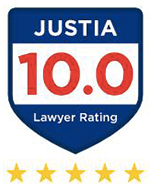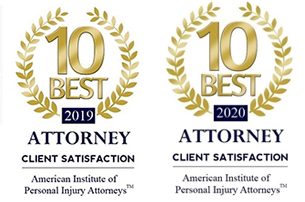
By: Leslie S. Harkavy, Esquire
Every single day accidents occur, but not every accident means you have a right to legal recourse. A personal injury occurs when you are hurt through someone else’s fault. When you are injured, a common question comes up: “What can you, as an accident victim do, to help yourself after an accident?” You are placed in a financially difficult position, through no fault of your own. However, through the legal assistance of a personal injury attorney, you could proceed with a bodily injury claim, with a goal of providing you with enough compensation to help soften the financial blow that inevitably comes from being injured in an accident.
But, how do you even know if you have a case that is worthy of legal pursuit? What are some of the factors you should be thinking about to answer this question? The best way to find out if you have a personal injury case is to call a personal injury attorney. However, there are a few things that you can ask yourself preliminarily to determine if you have a good enough case that would be accepted by a personal injury attorney. Generally speaking, if you can show that someone else caused your harm, you may have a worthy claim for compensation.
However, not every accident will result in a personal injury case and be worthy of pursuit by personal injury lawyers representing injured victims.
Take these 2 scenarios for instance:
Scenario No. 1 –
You are minding your own business, driving in your car and suddenly you get rear ended. You are in shock. Your neck hurts, your back hurts, you may have broken your arm. The other driver hovers around you. The police come. The ambulance arrives. You go to the hospital. Who pays for your property damage or your medical bills? What do you do about your lost time from work? What about the fact that you are too scared to get back into your car and drive again?
Scenario No. 2 –
You are minding your own business. Without realizing it, you run a red light. Suddenly, a car coming from your right goes through the same intersection at the same time, only that light is green and the other car strikes you. Your neck hurts, your back hurts. The other driver hovers around you. The police come. The ambulance arrives. You go to the hospital. Who pays the medical bills? What do you do about your lost time from work? What about the fact that you are too scared to get back into your car and drive again?
In Scenario No. 1 – you have a personal injury case. You are not at fault. You were rear ended. The other person had a duty of care to drive carefully. They breached their duty of care to you because they struck your car from behind. As a proximate result of them striking your car, you sustained an injury big enough that you needed to go to the hospital by ambulance. Your medical bills exceed the Massachusetts personal injury protection tort threshold of $2,000.00.
You may have injuries that will keep you out of work and make you afraid to get back into your car and drive again. You have a viable claim for personal injury against the owner and operator of the vehicle that hit you. The best thing you can do is call a personal injury lawyer immediately to help you navigate the legal system to get you the compensation you deserve.
In Scenario No. 2 – you caused the accident by running the red light. You will also have many of the financial consequences such as medical bills, lost wages and property damage, but because you are at fault, you cannot, in good faith, bring a bodily injury claim (but may have to defend one). This is because you breached the duty of care you owed to others on the roadway, to drive safely. You were the cause of your own injuries. The best thing you can do in this case is contact your insurance company and report the accident, confirm your insurance coverage and consider hiring a private attorney.
What do these two scenarios have in common? What are the common factors an attorney will look at to determine if your case is worthy?
- Who is at Fault?
The first thing a personal injury attorney needs to ask is who is at fault. This is where the legal concept of negligence comes into play. Negligence is defined by the elements of duty, breach, causation and harm. Did the person at fault person owe you a duty of due care and did they breach that duty? In order to be able to bring a personal injury law claim, a determination of fault must be made. If someone did something they should not have done, they are likely at fault.
There is also a concept known as comparative negligence. Massachusetts uses the 51 percent comparative negligence rule, which is similar to several other states. Under the rule, plaintiffs can only recover if their share of the blame was less than 51 percent. If plaintiffs are 51 percent or more at fault, then they cannot recover at all, with only a few exceptions. Massachusetts law does not allow an injured party 50 % or more at fault to recover for personal injuries. If the injured party is found at fault but that fault is determined to be less than 50%, then the injured party may bring a bodily injury claim against the party who is more than 50% at fault. However, any damages awarded are diminished in proportion to the injured party’s negligence. What this means is simple to understand with the following example: The injured party is found 30% at fault and his bodily injury claim is determined to be worth $100,000.00. Since the injured party is 30% at fault, his recovery is reduced by $30,000.00, which is a 30% reduction. The result is the victim receiving compensation in the amount of $70,000.00 to account for the percentage the victim is found at fault for the accident.
- What caused the injury?
The second question a personal injury attorney will be looking at to answer is what caused the injury. In other words, did someone’s failure to use due care result in your harm. If your injury was caused by the accident, your personal injury case will be strong. This is not always as clear as it may sound. You may have a pre-existing condition that was exacerbated, and the extent to which it was exacerbated will be a factor in determining damages that must be addressed, usually with the help of experts. There is also a concept in the law called “take your victim as you find her”. This means that if your victim has a head made out of an egg shell (also known as the “egg shell” plaintiff) the defendant would be responsible for the injury to the full extent as it impacted the plaintiff with the egg shell head, even though someone else with a normal head may have suffered a lesser injury due to the same impact. In another case, someone may need surgery for one type of injury, while in another person may not need surgery for the same injury. Every case is different. However, if the responsible party caused the injury, you are well on your way to a solid personal injury case.
- What is your injury?
The last question to answer is: what is your injury? Your injury needs to be clearly identified to be fully compensated by the at-fault party. There are many factors a personal injury lawyer considers in evaluating your case. Was it a minor soft tissue injury (typically seen as neck and or back pain) whereby you are expected to be back to where you were before the accident in less than 6 months? If you were injured in an automobile accident, will your medical bills exceed the $2,000.00 no- fault tort threshold to bring a personal injury claim? Where were you treated? How did you get there? Did you go to the hospital? Will you need surgery? How long is the recovery expected to take? Did you break a bone? Will you have a scar? Do you have any permanency? Will your life be forever changed? Are you at risk of further complications? How much are your medical bills? How much are your lost wages? The list of questions about your injury goes on and on. However, the extent of your injury is something that all personal injury attorneys will want to size up when they consider accepting your case.
Our experience with evaluating cases.
There are many common areas of personal injuries such as automobile accidents, motorcycle accidents, child injury accidents, construction site accidents, liquor liability, pedestrian accidents, bicycle accidents, premises liability, traumatic brain injuries, dog bites, inadequate security and slip and fall injuries that we routinely handle.
Recently Nadeau Harkavy LLC received the following personal injury settlements, just within the last year alone:
$1,000,000.00 policy limits for a man injured in an auto accident
$250,000.00 policy limits for pedestrian struck by truck
$175,000.00 recovery for professional who tripped and fell in a parking garage
$125,000.00 for a slip and fall at a business establishment
$100,000.00 for a driver in a car accident
$75,000.00 for a tenant who slipped and fell on snow and ice
Important first steps for injury victims:
- Consult with an attorney. The first thing you should do if you are involved in an accident and sustain injuries, whether due to an auto accident, a slip and fall on someone’s property other than your own, a dog bite, or a bicycle accident, is to consult with an attorney. An experienced personal injury lawyer can help you understand whether or not the other party is at fault. Further, an analysis will need to be done as to fault and who caused the accident. Is there a defendant- a responsible party, whether it is a person or a corporation or a business- from whom you can seek compensation and/or who may have insurance coverage? Almost every case we handle involves insurance so that the compensation we receive for our client comes from the insurance company and not the at fault party personally. The extent and severity of your injuries will also need to be considered. This will include an analysis by your personal injury attorney of your diagnosed injuries, medical costs, pain and suffering and lost wages. Your legal options will need to be explored to determine the nest course of action for you.
- A preliminary investigation needs to be done. The attorney you hire will conduct an investigation into the merits of your claim and review the liability aspect through a careful examination of the police report, accident scene, property damage, surveillance videos (if available) and witness statements. Your personal injury attorney will also examine the extent of your damages through an analysis of your medical records and bills, employment situation and lost wages. But what about your spouse, who had to stop working to help take care of you? Does she have a claim? What about the expenses you incurred to have someone rake your leaves while you were laid up? Can those be reimbursed? A competent personal injury attorney will address all of these questions and more.
- A Demand package will need to be “meticulously” prepared and sent. After giving notice to the responsible party and dealing with their insurance company, your focus is on getting better. However, when your medical treatment is complete, your attorneys will be ready to prepare and send a demand package for settlement of your claim. This demand package will outline the strengths of your case, and legal theories of recovery with appropriate case citations as to both liability and damages including jury verdict and settlement research. This package will include proof of your injuries through a summary of your related medical records, bills, employment records showing time lost and wages usually received, expert articles and reports (if necessary) and photographs. At Nadeau Harkavy LLC, we use our over 60 years of experience in personal injury law to meticulously prepare your case from the very first day you come on board with us for the insurance company to review. We do this by gathering all the information necessary to prove the value and extent of your injuries to the insurance company in order to put you in the best position to maximize your case value early on and resolve the matter for you as quickly as possible.
How do you know if you have a personal injury case? You may not necessarily know, but never be afraid to ask an experienced injury attorney if you may have a claim that can be considered a personal injury matter. At Nadeau Harkavy LLC, we are happy to have a conversation with you about your accident and whether there may be a viable claim to pursue. The consult with us is free. You do not pay any legal fee unless we recover money for you.
When someone is injured in a motor vehicle accident, slip and fall, or through any other accident, a thorough investigation of the accident events is necessary to determine the cause of the accident and secure important information. As a victim of an accident, make sure everything is done to protect your interests. The lawyers at Nadeau Harkavy LLC help victims and their families recover compensation in serious injury and wrongful death cases arising from car crashes and other accidents. If you have any questions about your legal rights relating to a car accident, wrongful death or other accident, feel free to contact us for a free consult today at 617-674-7640.
Meet The Lawyers
With 60 years of combined experience serving injured victims in Massachusetts, our team has collaborated for nearly two decades, delivering a proven track record of outstanding results for clients. Guided by a philosophy of treating clients as we would our own family, we strive to ease our clients' journey from the initial phone call to case resolution. Committed to competing and fighting vigorously, we aim to hold insurance companies accountable to the fullest extent of the law. Our belief in close communication ensures the best possible outcomes, and our approachability makes us readily available to you. Entrust us with your case, allowing you to focus on your physical, emotional, and financial recovery.
Massachusetts Personal Injury Lawyers
Massachusetts Personal Injury Lawyers with over 60 Years Combined Experience Representing Those Injured in Accidents.












